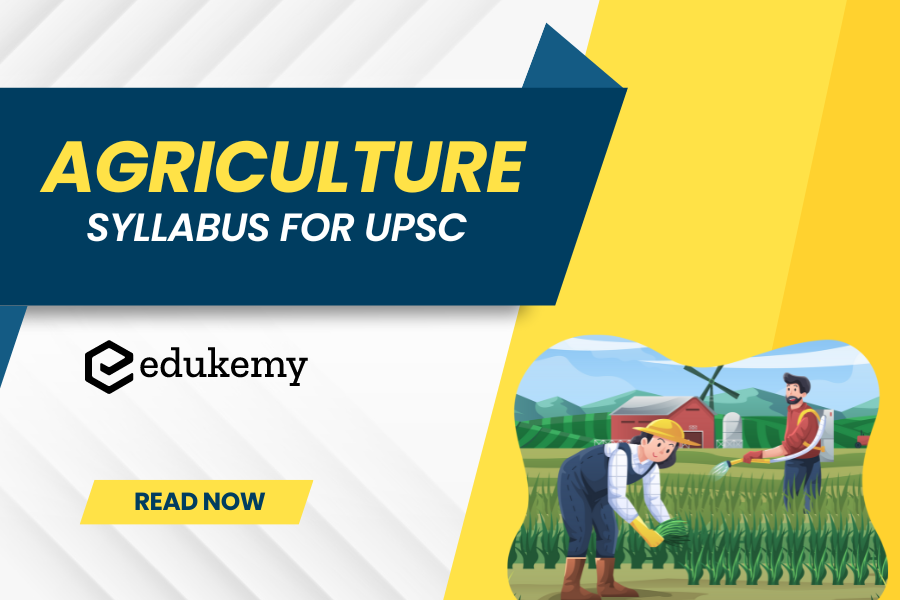
The Agriculture Syllabus for the Union Public Service Commission (UPSC) provides a comprehensive framework that aims to assess candidates’ knowledge and understanding of agricultural practices, policies, and challenges. Designed to evaluate the candidates’ proficiency in diverse aspects of agriculture, the syllabus encompasses topics such as agronomy, soil science, plant breeding and genetics, agricultural economics, agroecology, and animal husbandry. With a focus on both theoretical principles and practical applications, the UPSC Agriculture Syllabus reflects the importance of agriculture in the Indian context, addressing issues related to sustainable farming practices, rural development, and the role of agriculture in the national economy. Aspiring candidates engaging with this syllabus will gain a holistic understanding of the agricultural sector, preparing them for the challenges and opportunities inherent in the dynamic field of agriculture.
Contents
- 1 Agriculture – Topics and Sub-Topics
- 2 FAQs for Agriculture Syllabus for UPSC
- 2.1 Q: What are the key topics covered under the agriculture syllabus for UPSC?
- 2.2 Q: How important is the understanding of agricultural economics in the UPSC examination?
- 2.3 Q: Are there specific government schemes and policies related to agriculture that candidates need to be familiar with?
- 2.4 Q: How can candidates prepare for the practical aspects of agriculture in the UPSC examination?
- 2.5 Q: What role does environmental sustainability play in the agriculture syllabus for UPSC?
- 3 In case you still have your doubts, contact us on 9811333901.
Agriculture – Topics and Sub-Topics
Agriculture is a broad field that encompasses various topics and sub-topics related to the cultivation of crops, raising livestock, and other practices associated with farming. Here is a list of key topics and sub-topics within the field of agriculture:
- Crop Agriculture:
- Crop Selection and Rotation
- Crop Cultivation Techniques
- Sustainable Farming Practices
- Precision Agriculture
- Organic Farming
- Hydroponics and Aquaponics
- Pest and Disease Management
- Soil Health and Fertility
- Genetic Modification and Biotechnology in Crops
- Livestock Farming:
- Animal Husbandry
- Livestock Breeding and Genetics
- Animal Nutrition
- Disease Control and Prevention
- Sustainable Livestock Farming
- Dairy Farming
- Poultry Farming
- Swine Farming
- Beef and Cattle Farming
- Sheep and Goat Farming
- Agricultural Economics:
- Farm Management
- Agricultural Marketing
- Agribusiness
- Farm Subsidies and Policies
- Global Trade in Agriculture
- Agricultural Finance
- Risk Management in Agriculture
- Agricultural Technology:
- Farm Machinery and Equipment
- Precision Farming Technologies
- Drones and Remote Sensing
- IoT (Internet of Things) in Agriculture
- Artificial Intelligence in Agriculture
- Blockchain in Agriculture
- Environmental Impact:
- Sustainable Agriculture
- Conservation Farming
- Water Management in Agriculture
- Biodiversity in Agricultural Systems
- Climate Change and Agriculture
- Agroforestry:
- Integration of Trees and Crops
- Forest Farming
- Alley Cropping
- Windbreaks and Shelterbelts
- Food and Nutrition:
- Food Security
- Food Safety and Quality
- Nutritional Aspects of Crops and Livestock
- Food Processing and Preservation
- Rural Development:
- Rural Infrastructure
- Community Development
- Sustainable Rural Livelihoods
- Women in Agriculture
- Research and Education in Agriculture:
- Agricultural Research
- Extension Services
- Agricultural Education and Training
- Government Policies and Regulations:
- Agricultural Policies
- Land Use Policies
- Environmental Regulations
- Farming Subsidies
- Agri-Tourism:
- Farm Tours and Experiences
- Agritainment
- Agricultural Challenges:
- Water Scarcity
- Soil Erosion
- Climate Change
- Global Food Security
- Agricultural Labor Shortages
FAQs for Agriculture Syllabus for UPSC
Q: What are the key topics covered under the agriculture syllabus for UPSC?
A: The agriculture syllabus for UPSC includes a broad range of topics such as agronomy, soil science, plant breeding and genetics, horticulture, animal husbandry, agricultural economics, agroforestry, and related areas. It also encompasses current issues in agriculture, government schemes, and policies related to agriculture.
Q: How important is the understanding of agricultural economics in the UPSC examination?
A: Agricultural economics is a crucial component of the agriculture syllabus for UPSC. Candidates are expected to have a comprehensive understanding of the economic aspects of agriculture, including farm management, agricultural marketing, price support mechanisms, and the impact of government policies on the agricultural sector.
A: Yes, candidates should be well-versed with various government schemes and policies related to agriculture. This includes schemes for crop insurance, irrigation, agricultural credit, and subsidies. Knowledge of recent policy changes and their implications for farmers is essential for the UPSC examination.
Q: How can candidates prepare for the practical aspects of agriculture in the UPSC examination?
A: While the UPSC examination primarily tests theoretical knowledge, candidates should be prepared to apply their understanding to real-world scenarios. Practical aspects may include crop rotation strategies, pest management techniques, and sustainable farming practices. Candidates should stay updated on modern agricultural technologies and their implications.
Q: What role does environmental sustainability play in the agriculture syllabus for UPSC?
A: Environmental sustainability is a significant aspect of the agriculture syllabus. Candidates should understand the impact of agricultural practices on the environment, soil conservation techniques, and the importance of sustainable farming methods. Questions may also focus on the role of agriculture in climate change mitigation and adaptation.
In case you still have your doubts, contact us on 9811333901.
For UPSC Prelims Resources, Click here
For Daily Updates and Study Material:
Join our Telegram Channel – Edukemy for IAS
- 1. Learn through Videos – here
- 2. Be Exam Ready by Practicing Daily MCQs – here
- 3. Daily Newsletter – Get all your Current Affairs Covered – here
- 4. Mains Answer Writing Practice – here

